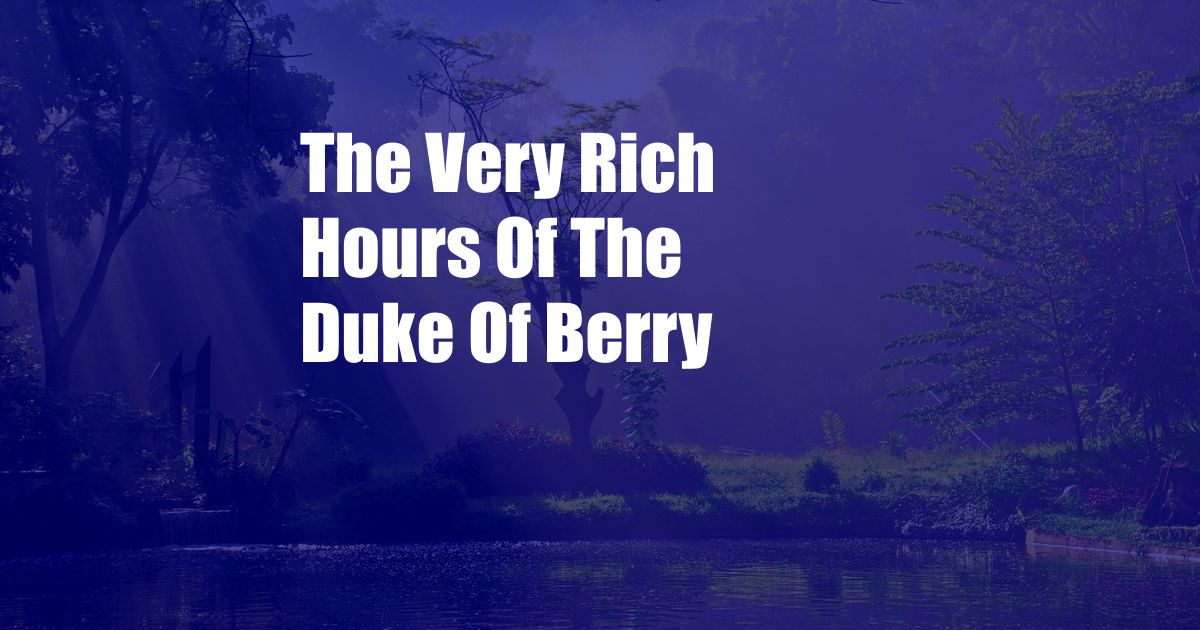
The Very Rich Hours of the Duke of Berry: A Testament to Medieval Splendor
In the heart of medieval Europe, there lived a bibliophile of extraordinary wealth and discerning taste: the Duke of Berry, Jean I. His lavish patronage of the arts left an indelible imprint on history, and among his most prized possessions were a series of sumptuous illuminated manuscripts known as “The Very Rich Hours of the Duke of Berry.”
These exquisite codices, meticulously crafted by the finest artisans of the time, were not mere books but opulent masterpieces that showcased the pinnacle of medieval manuscript illumination. The pages of “The Very Rich Hours” were adorned with vibrant colors, intricate gold leaf, and breathtaking miniatures that captured the essence of the duke’s lavish court and the everyday life of 15th century France.
A Glimpse into the Duke’s World
The miniatures, painted with unparalleled skill and attention to detail, depicted scenes of the duke’s court, his hunting expeditions, and his devotional life. We see him surrounded by his courtiers, engaged in games of chess or backgammon, or receiving visitors in his grand halls.
The calendar pages, each dedicated to a specific month, offer a captivating glimpse into the rhythms of medieval society. They feature laborers tending fields, vineyard workers harvesting grapes, and peasants celebrating festivals. The duke’s own daily activities are depicted, from rising at dawn to retiring at night, providing an intimate window into his private life.
The Artistic Genius of the Limbourg Brothers
The “Très Riches Heures” owes its unparalleled beauty to the artistry of the Limbourg brothers, Jean, Herman, and Pol. These three masters of illumination were the sons of a goldsmith, and their exquisite craftsmanship is evident in every brushstroke.
Their miniatures are characterized by a vibrant palette, a mastery of perspective, and an uncanny ability to capture the emotions and expressions of their subjects. The attention to detail is simply astonishing, from the delicate lacework on the duke’s clothing to the intricate patterns on the tapestries hanging in his chambers.
Symbolism and Iconography
Beyond their aesthetic value, the miniatures of “The Very Rich Hours” are also rich in symbolic meaning. The Duke of Berry was a deeply religious man, and the book is replete with biblical scenes and allegorical references.
The inclusion of the duke’s coat of arms, the motto “Je Suis Berry” (I am Berry), and personal emblems throughout the manuscript underscore his desire to immortalize his legacy and assert his political authority. The elaborate borders and marginal decorations are filled with intricate patterns, animals, and mythical creatures, each of which carries symbolic significance.
A Lasting Legacy
The “Very Rich Hours of the Duke of Berry” is not merely a historical artifact but a testament to the enduring power of art. It has survived wars, revolutions, and the passage of time, and continues to captivate audiences with its beauty, historical value, and timeless appeal.
Today, the manuscript is housed in the Musée Condé in Chantilly, France, where it remains a source of inspiration for scholars, artists, and art enthusiasts alike. Its pages continue to tell the story of a bygone era, offering a glimpse into the opulent world of the medieval aristocracy and the extraordinary talents of the artists who created such enduring masterpieces.
Tips and Expert Advice: Enhancing Your Understanding
To fully appreciate the “Very Rich Hours of the Duke of Berry,” consider these tips and insights from experts:
– Visit the Musée Condé: Experiencing the manuscript in person is an unparalleled opportunity to witness its exquisite details and rich colors.
– Research the historical context: Understanding the social, political, and religious landscape of 15th century France will deepen your appreciation for the symbolism and significance of the miniatures.
– Study the Limbourg brothers: Explore the lives and techniques of these master illuminators to gain a deeper understanding of their artistic process.
– Analyze the iconography: Pay attention to the hidden meanings and symbolic references within the miniatures to uncover the deeper layers of the manuscript’s message.
FAQ: Unraveling the Secrets
Q: How many pages are in “The Very Rich Hours of the Duke of Berry”?
A: The manuscript contains 206 pages.
Q: What is the significance of the calendar pages?
A: The calendar pages depict typical activities, customs, and occupations of each month, offering a glimpse into medieval society.
Q: Was the manuscript always intended for the Duke of Berry?
A: No, it was initially commissioned by his uncle, Duke Charles V of France, but was acquired by the Duke of Berry at a later date.
Q: What makes “The Very Rich Hours” unique?
A: The combination of its artistic brilliance, historical significance, and meticulous attention to detail sets it apart as a masterpiece of medieval illumination.
Conclusion: A Call to Further Exploration
The “Very Rich Hours of the Duke of Berry” is more than just a manuscript; it is a living testament to the splendor of medieval art and the ingenuity of its creators. It invites us to step back in time and immerse ourselves in the opulent world of the Duke of Berry, while also appreciating the enduring legacy of the Limbourg brothers’ artistic genius.
For those captivated by the beauty and history of this extraordinary manuscript, I encourage you to delve deeper into its mysteries. Visit the Musée Condé, study its pages, and engage with the wealth of resources available online. The “Very Rich Hours of the Duke of Berry” has much to offer, and I hope you will continue to explore its captivating world.
Is the rich history and stunning artwork of “The Very Rich Hours of the Duke of Berry” something that interests you? Let me know in the comments below!